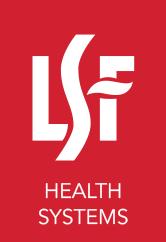HELPING PEOPLE HEAL
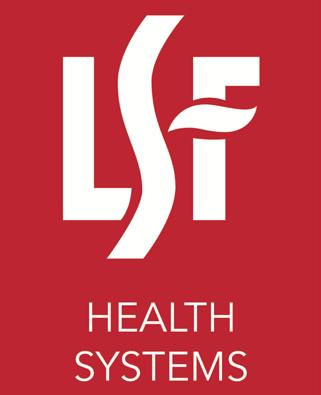
FY21-22


FY21-22
Cassandra Croft found new purpose and direction in her life using her lived experiences with addiction to help others recover and heal. Croft is pictured above (center) with fellow peer specialist Taniko Hampton (right) and an individual receiving assistance. Read more inside about the innovative recovery peer apprenticeship program that LSF Health Systems has launched and how it’s helping save lives every day.

We create a world of safe children, strong families, and vibrant communities. We envision communities where every child, adult, and family have access to the behavioral health care services they need to live well and be well.
Our Mission
Our mission is to develop and sustain an integrated system of behavioral health care through a network of services built on integrity, innovation, and collaboration.
• Compassion
• Generosity
• Honesty
• Innovation
• Justice
FY22-23
Dawn Gilman, Chair Chief Executive Officer
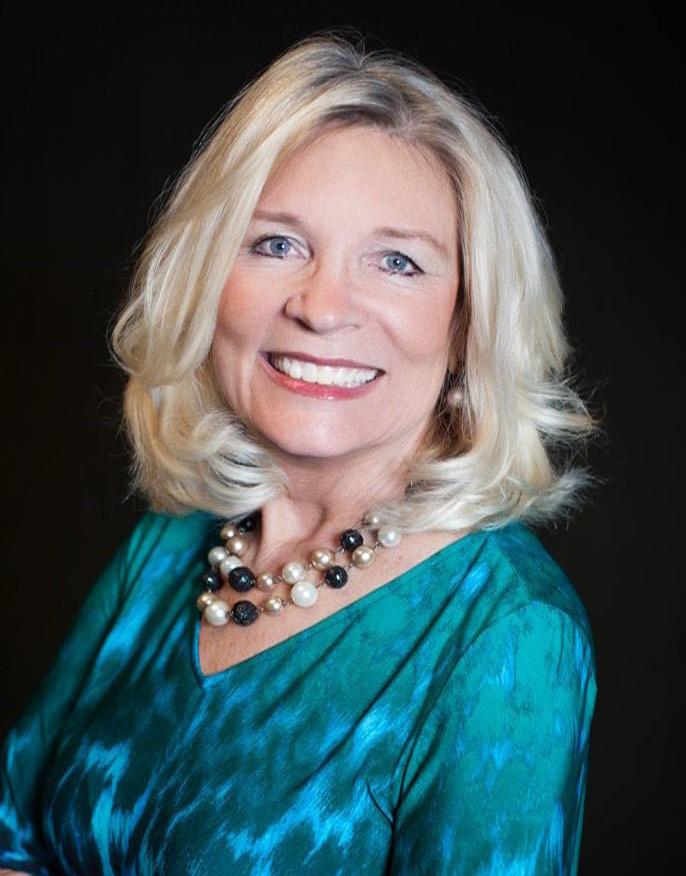
Changing Homelessness
Dr. Vicky Basra
President & CEO
Delores Barr Weaver Policy Center
Lisé Everly Community Leader
The Hon. Denise R. Ferrero Circuit Court Judge Eighth Judicial Circuit
Shawna Novak
Director, Health & Human Services
CEO, Family Integrity Program St. Johns County Board of County Commissioners
Peggy Schiffers Community Leader
Dr. Ahmed Waqas Founder / CEO American TelePhysicians
T.K. Waters Sheriff Jacksonville Sheriff’s Office
FY21-22
Dawn Gilman, Chair Chief Executive Officer Changing Homelessness
Dr. Vicky Basra President & CEO Delores Barr Weaver Policy Center
Chet Bell
Retired CEO SMA Behavioral Healthcare
Lisé Everly Community Leader
Leslie Jean-Bart Terrell Hogan Law Firm
Shawna Novak
Director, Health & Human Services
CEO, Family Integrity Program St. Johns County Board of County Commissioners
Jenn Petion
President & COO Family Support Services of North Florida
Peggy Schiffers Community Leader
The Hon. Joseph Will Retired Circuit Court Judge Seventh Judicial Circuit
Mike Williams Sheriff Jacksonville Sheriff’s Office
Melissa Witmeier Family Member/Suicide Prevention Expert Director of Grant Initiatives Girls Scouts of the Gateway Council
Message from Dr. Cauffield

Last fall I had the pleasure of hosting our partner organizations, funders, and friends at a celebration in Jacksonville of LSF’s 40th Anniversary. The event was a wonderful opportunity to thank those who help our organization make a crucial difference in the lives of hundreds of thousands of Floridians each year.
It also prompted me to reflect on how much the world has changed during the 40 years that our organization has been serving the needs of citizens who often lack the resources to find help on their own.
Forty years ago, in the early 1980s, the world was just beginning to understand the extent of the global pandemic of HIV/AIDS. The disease’s emergence spawned waves of fear, misinformation and even hatred. It took 15 years for the development of an effective antiretroviral therapy while the virus killed 30 million.
While it’s been a long and stressful two and one-half years navigating the COVID-19 pandemic, the world’s health systems have progressed so far from how we handled previous epidemics and pandemics.
I’m extremely proud of the important role that LSF Health Systems played in helping Florida get through the pandemic. It is well documented that mental health, substance misuse, and thoughts of suicide increased dramatically during COVID. Our team members, leadership, and partners demonstrated countless examples of courage and innovation that saved many lives. I wish each of you reading this impact report could know the feeling I’ve had watching members of our organization take risks and make decisions that literally made the difference between life and death for those we serve.
Also at our 40th Anniversary party, I had the opportunity to present our inaugural Lighting the Way Leadership Award to Florida Sen. Darryl Rouson. I’ve had the pleasure of working closely with Sen. Rouson for many years, but it was a special honor for me to publicly recognize his years of dedication to making life better for Floridians who suffer from behavioral health challenges.
As many of you know, Sen. Rouson overcame his own challenges with substance misuse to go on and become a state leader in helping others beat this disease. He’s such an inspiration to all of us working in this field, and his story serves as a shining example – lighting the way for all of us who aspire to make our lives about something bigger.
Thanks to all of you who support the important work that LSF Health Systems and our partner organizations do, and the successes we’ve enjoyed this past year. While I know we’ve helped hundreds of thousands, my job constantly reminds me of Ralph Waldo Emerson’s definition of success: to know even one life has breathed easier because you have lived, this is to have succeeded.
With Immense Gratitude,
Dr. Christine Cauffield CEO, LSF Health Systems
04 10 09
06 11 12 13
08
Numbers FY2021-2022 Revenue Overview
14
FY2021-2022 Performance Outcomes
Cassandra Croft turned her pain into a gift through LSF Health Systems’ Certified Recovery Peer Specialist (CRPS) apprenticeship program. Now she’s working to help others do the same thing.
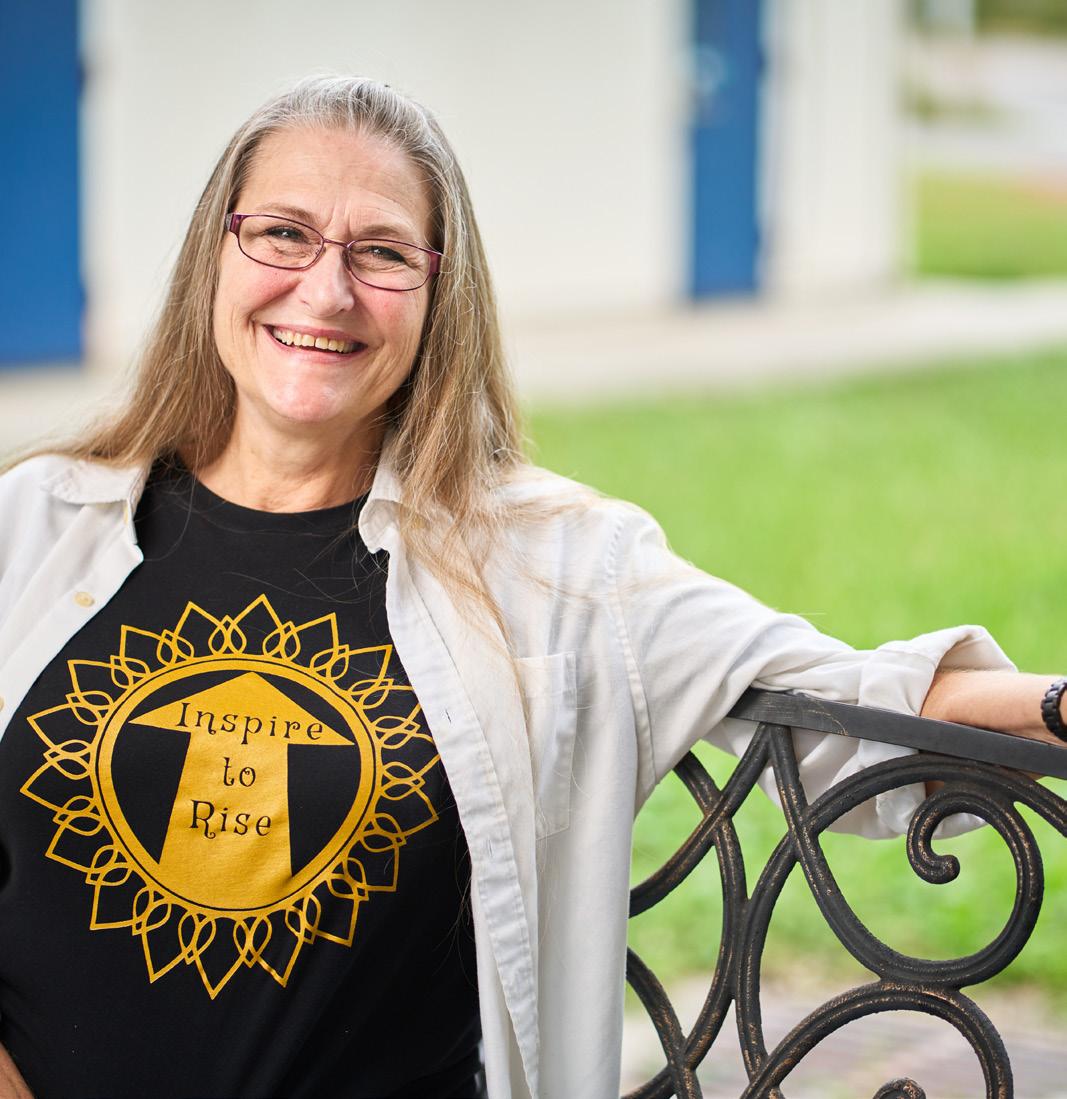
Croft was among the first in a new program that helps those who have overcome addiction and mental health challenges learn to use their experience to help others.
“I’m not glad I went through what I went through, but it’s like I was put through all that for a reason,” Croft said. “It’s like when we take grapes and crush them, we get a choice about whether they can become wine or vinegar.”
Croft was molested and abused as a child before struggling with addiction and crime in early adulthood. She says therapy and LSF Health Systems’ CRPS program taught her to use her pain and experiences to show others how to change their lives.
LSF Health Systems pioneered the use of certified recovery peer specialists (CRPS) in Florida, training more than 300 paraprofessionals since 2015 who use their own life experiences to help others struggling with substance misuse and mental health challenges.
The nonprofit is now expanding its work in the area with a new program that allows peers to participate in a unique apprenticeship experience that provides additional opportunities for career development and advancement.
“Working with three Northeast Florida area providers, LSF Health Systems has launched a program that places trained peers in clinical settings for an experience that leads to a greater understanding of today’s challenges as well as to potential employment opportunities,” said Elisha Gumataotao, who leads LSF Health Systems’ peer training program.
The new expansion, called Opioid Impacted Family Support Program, is designed to enhance participants’ knowledge, skills, and expertise. The paraprofessional training offers two Level 1 certification tracks and a follow-up Level 2 apprenticeship program.
The federally funded program focuses on peers who work with adults impacted by opioid use disorders as well as their children, teens, and other family members in guardianship roles. It aims to help families in high demand areas and those who are at risk for mental health challenges and substance misuse.
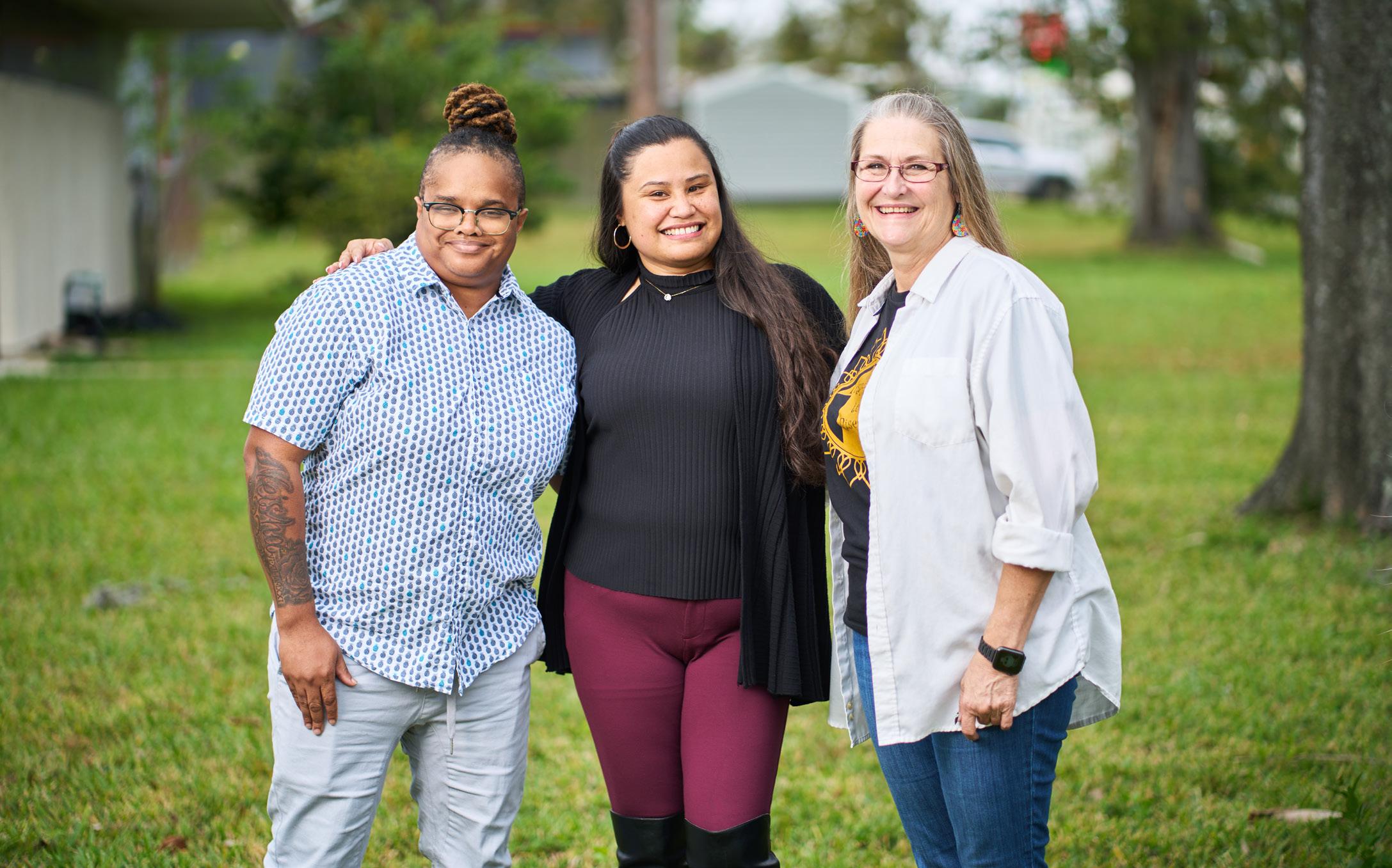
While the Level 1 tracks require LSF Health Systems’ traditional training to augment participants’ lived experiences, the new paid Level 2 apprenticeship program includes one year of real-world work experience in a high-need, rural or medically under-served area as well as 1,000 hours of additional experiential field training.
“The apprenticeship program provides the peers we train with hands-on, real-world experiences,” Gumataotao said. “They get follow-up training with professional supervision and bring what they’ve learned from their lived experiences to peers in the training.”
“Although it’s early in the program’s history, the partner providers have given very positive feedback on the work being done by the peers in the apprenticeship
program,” Gumataotao said. “Our partners say they can always tell when a peer is from LSF Health Systems’ training program,” she said. “They tell us that our peers are very well prepared.”
Through the program, peers can become dual certified if they apply for and meet the criteria for both the Certified Recovery Peer Specialist (CRPS) and Certified Recovery Support Specialist (CRSS) credentials under Level 1. As part of its commitment to the federal grant funding, LSF Health Systems expects more than half of the 132 peers who complete the Level 1 tracks during the four-year grant will go on to complete the Level 2 apprenticeship program.
The use of peer specialists in Florida has been rapidly expanding since LSF Health Systems and its Training Academy first began training peers almost a decade ago. Earlier this year, the Florida Legislature passed legislation that establishes standards for certified peer specialists and allows them to be part of the state’s alcohol and drug misuse delivery system.
The bill amends state law to classify certified peer specialists as an essential part of a coordinated system of care for the treatment of substance use disorders.
If you are interested in becoming a part of the behavioral health apprenticeship program at LSF Health Systems, contact us at peer.network@lsfnet.org.
HRSA/HHS and $0 funded by non-government sources. The contents are those of the author(s) and do not necessarily represent the official views of, nor an endorsement, by HRSA/HHS, or the U.S. Government
“It’s like when we take grapes and crush them, we get a choice bout whether they can become wine or vinegar.” -
Peer Specialist Apprentice Cassandra Croft
Portions taken with permission from the Ocala Star Banner
OCALA, Fla – When John Pracko arrived at substance use treatment campus Beacon Point in September 2021 for alcohol detoxification, he was “a mess,” he said.

“I drank every day, like I would drink till I couldn’t function basically because I didn’t want to deal with anything,” Pracko said. “But with the help of Beacon Point and all of the support and stuff they’ve given me, I have another opportunity in life right now.”
Pracko is one of many Marion County individuals who have benefited from LSF Health Systems’ SETS (Screen, Engage, and Treat for Success) program, where peer specialists, who are in recovery themselves, serve people with substance use disorders.
With instances of substance use and overdoses rising in recent years, the program has been successful in preventing repeat emergency room visits and has expanded screening services to local primary care clinics.
LSF Health Systems was awarded a 2021 five-year $5 million grant from the Substance Abuse and Mental Health Services Administrtion (SAMHSA) for Project SETS’s Screening, Brief Intervention and Referral to Treatment (SBIRT) in Marion and Lake counties. The initiative partners with medical facilities with the goal of early identification and education relating to substance misuse.
Using the SBIRT screening as a vital sign for substance use, just like blood pressure is taken at medical appointments, SBIRT screening is being incorporated into the medical model. Individuals who screen with moderate levels of substance misuse are provided a brief intervention by trained peer specialists on the spot to educate them on the risks of their behavior.
This session is completed using evidence-based tools such as motivational interviewing combined with educational resources provided by SAMHSA and National Institute on Drug Abuse (NIDA) to encourage behavioral change. Individuals who screen with moderate or highrisk substance use are referred to higher levels of care as determined appropriate by a treatment navigator.
For these people, six brief treatment sessions with the treatment navigator are provided to assist in connecting
to appropriate care and determining what resources are needed for treatment retention. All services are provided at no cost for those involved.
After six months, follow-up calls are made to individuals who initially screened positive to reassess for behavioral change. Screenings are done on-site at each partner location and the staff are embedded in the workflow.
The project goals are to screen 25,000 individuals and train staff members at each location to continue the use of SBIRT. Initial locations included Langley Federally Qualified Health Care Center and LifeStream Primary Health Care Clinics.
Other locations added since have included AdventHealth Waterman ED, Heart of Florida Primary Care and OBGYN Clinic, SMA Healthcare, Marion County Health Department, Lake County Health Department, South Lake Hospital ED, Freedom Mobile Dental Clinic, Wellness Integration Clinic Leesburg, Wellness Integration Clinic Eustis, and AdventHealth Ocala.
Like Pracko, Vanessa Autry feels the program has given her another chance after her overdose.
“It was life-changing. Before, I felt like I was always in pain,” she said, adding that no one understood what she was going through. “I felt like I’m broken and lost. I had no hope, anything like that. I got a second chance to redeem myself.”
Thanks to a grant from the Florida Blue Foundation, LSF Health Systems started the SETS project in 2018, using certified recovery peer specialists to help overdose survivors and at-risk individuals access treatment and recovery support services.
The organization contracts with local facilities like Park Place Behavioral Health Care at Beacon Point to fund such substance use and mental health programs in Marion County, said Stephanie Mooneyham, SETS project coordinator.
“Initially, if somebody was identified as in an overdose situation and was brought to the emergency room, our staff would then get a phone call from either law enforcement, EMS or nurses at the hospital and within 60 minutes deploy to the hospital to engage that individual and have a conversation,” Mooneyham said.
“We’re now embedded in the 911 system. When 911 gets an overdose call, they call our peer line and our peer meets the ambulance at the hospital,” she added.
Peer specialists currently respond to cases at AdventHealth Ocala, Ocala Regional Medical Center and West Marion Community Hospital. They assess each situation and talk to individuals about their recovery.
“The good thing is our peer specialists are in recovery, so it’s a non-judgemental conversation,” Mooneyham said. “It’s, ‘I get it. I’ve done it. I’ve lived it. I’ve sat where you’re sitting. I’ve felt how you’re feeling, and look at me. You can do this too.’ ”
Once individuals are medically cleared and willing to take the next step, they can be transported to detox beds. Mooneyham says not everyone is ready or able to commit to medication-assisted treatment with group therapy and weekly meetings, so others meet with peer specialists regularly and talk about harm reduction.
“If you can’t do what the gold standard of treatment is, it doesn’t mean you don’t deserve to seek recovery,” she said. “Everyone has their own motivation and their own comfort level. We’re not here to tell you there’s only one way that’s best because that’s not accurate.”
Autry, who is living in a sober home and working again, says it was helpful having a non-judgemental peer also in recovery.
“I feel like I could learn from them because of their experience before in the past, and they could help me,” she said. “I’ve done something, and they’ll tell me, ‘OK, I’ve already been through this,’ and they give me the tools, but it’s my choice if I want to use them or not.”
Autry says everyone makes mistakes in life, but she was given a chance to pick herself up with the help of a recovery peer support specialist.
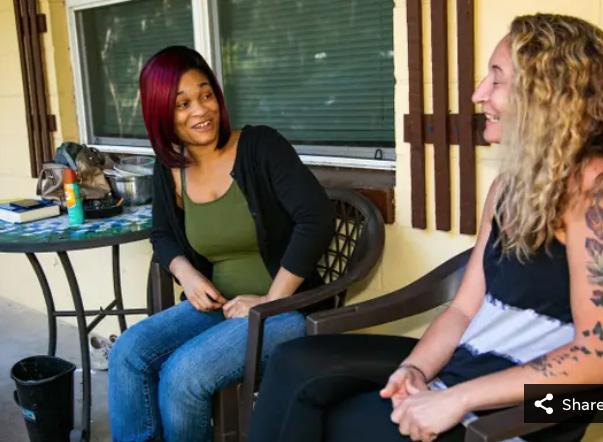
Pracko also found it easier to talk to someone with shared experience.
“Before, I wouldn’t open up and accept help from people, but with these guys and the program that they have, I was able to open up and be vulnerable enough to accept what they had to offer instead of being so closeminded,” he said.
“I got a job, so I’m working,” he said. “I’m working on paying my bills and trying to be back to a productive member of society because before I was definitely not any of those things, and there’s a lot of support in Ocala
with recovery, which is very good and comforting.”
Travis McAllister, the certified recovery support supervisor for Park Place at Beacon Point, got involved in behavioral health care services five or six years ago after someone mentioned it at an Alcoholics Anonymous meeting during his own recovery.
“We’re bringing the lived experience to people we’re trying to help,” he said. “After I told people I was in recovery, I got a different response. They were more open or less resistant.”
There are benefits both ways, McAllister said, as the peer specialists and those in treatment help each other with their recovery.
They’ve seen about hundreds of clients come through the hospitals since with about 10% being return clients, a statistic they are working to decrease.
Substance misuse and overdoses have increased during the pandemic. There are 20,000 overdose ER visits annually in Florida. The SETS model, which uses the SBIRT approach, has helped cut return visits in half, contributing to savings in the form of both finances and human lives.
Depending on the assessment, individuals may be given a brief intervention or treatment referral with the aim of preventing future overdoses.
The 5-year SETS SBIRT project is supported by a SAMHSA SBIRT Grant, Number H79TI084098. The views expressed herein do not necessarily reflect the official policies of the Department of Health and Human Services, nor does the mention of trade names, commercial practices, or organizations imply endorsement by the U.S. Government.
It’s time to start talking about mental health like we talk about our day, our families, or our favorite movies. For years, people have been silently suffering and struggling. Thanks to a variety of innovative programs being implemented throughout LSF Health Systems’ region, people are becoming more aware of the importance of mental health and the resources that are available.
Unfortunately, some are still afraid to step out of their comfort zone and ask questions or seek help. That’s where LSF Health Systems’ Mind Redefined: Lifting the Stigma Around Mental Health comes in. Mind Redefined is the organization’s mental health awareness podcast launched in 2021 thanks to a competitive federal grant from the Substance Abuse and Mental Health Services Administration (SAMHSA). It’s designed to pull back the curtain on tough issues like domestic violence and suicide, opening such conversations in a safe space. The first episode dropped in February 2021 about mental health and the pandemic.
a tragic time in our lives,” said
“There was a global prevalence of anxiety and depression amid isolation, uncertainty, drastic change, and death. In the midst of this challenge, we saw firsthand the effect it had on mental health. It’s about time we talked about it confidently and openly.”
Our podcast hosts have since touched on veterans’ mental health, human trafficking, racial stress and more. It’s important to LSF Health Systems that the innovative podcast stays relevant to issues we experience in realtime. We bring real experts into these discussions and feature professionals who are well-versed in not only exploring mental health topics, but also giving helpful advice to listeners.
Several of our podcasts have featured Cauffield, who is integral to the continued innovation at the organization. The podcasts have also featured mental health trainers, licensed clinical social workers, CEOs of various mental health organizations and more.
“I don’t celebrate the trials and tribulations and the loss that people have endured due to the pandemic, but rather the acceptance that mental health is for all, and that you’re not alone in feeling depressed or anxious or fearful,” said Suzanne Mailloux, Executive Director of the National Alliance on Mental Illness-Jacksonville. Mailloux is featured in Episode 22: Family Challenges
and Mental Health Awareness. The episode focuses on the challenges families face when a loved one is suffering from a mental health issue. In the podcast, Mailloux debunks mental health myths and directs listeners to resources for navigating familial matters.
“If we recognize these feelings as normal, then we can open up and learn when it becomes overwhelming or inhibits daily life, and we can seek treatment before we have mental health crises,” Mailloux said.
Mind Redefined has covered a range of important topics:

• Human trafficking, trauma, and mental health awareness
• Compassion fatigue
• The art of finding hope
• De-escalation and navigating conflict resolution
• Domestic violence survivor success stories

“We’re discussing mental health like it’s your physical health, which is what everyone should be doing,” Cauffield said. “This innovative approach has reached folks not only in Florida but also throughout North and South America, Europe, Oceania, Asia and Africa, breaking down barriers and shattering stigma one person at a time.”
You can find our podcast on our website or subscribe and listen via Apple Podcasts, Spotify, and Google Podcasts.
The project described was supported by a Mental Health Awareness Training Grant, Number H79SM081468 from SAMHSA. The views expressed by speakers and moderators do not necessarily reflect the official policies of the Department of Health and Human Services, nor does the mention of trade names, commercial practices, or organizations imply endorsement by the U.S. Government.
With mental health challenges on the rise during the corona virus pandemic, LSF Health Systems secured a competitive $800,000, 16-month SAMSHA COVID-19 Emergency Response for Suicide Prevention grant to implement suicide prevention best practices for adults 25 years of age or older in Duval County.
Project partners included healthcare, housing, and domestic violence service providers such as Mental Health Resource Center, Baptist Health, UF Health, Changing Homelessness, I.M. Sulzbacher and Hubbard House. The grant allowed for the implementation of Zero Suicide best practices through screening and intensive care coordination.
The project included a Take Suicide Off the Table media awareness campaign that was carefully crafted using data collected from qualitative focus groups of care coordinators who had worked with individuals at risk for suicide. The goal was to urge people who were feeling hopeless to seek support so they could take suicide “off the table” and begin building better tomorrows.
In total, the multi-phased campaign achieved more than 39.5 million viewer impressions and generated 22,000 visits to the informational web page. More than 2,000 individuals were screened for suicidality and 450 people were referred and enrolled in intensive care coordination to reduce their risks. The positive outcomes and the partnerships established because of this project resulted in Mental Health Resource Center’s success in securing another SAMHSA grant to sustain the program beyond the initial funding period.
In Duval County, the campaign focused on MHRC’s Link to Life program, which enabled program participants to get free on-site or phone-based support for up to six months. The campaign used slightly different messaging for the other 22 counties served by LSF Health Systems to ensure that at-risk individuals could obtain the right information and the right resources at the right time.
All advertising vehicles guided those seeking help to lsfhealthsystems.org/suicide landing page which offered resources, success stories, and a testimonialbased video highlighting an individual who had survived suicide and the counselor who helped her.
The first phase of the campaign utilized a layered media strategy, incorporating digital display ads, cable television advertisements, billboards, and social media advertisements. The second phase allowed for an even more robust media mix, blending in additional elements such as streaming radio, YouTube, and streaming television.
The implementation also led to quality improvements in the agency’s best practices and policies and procedures surrounding suicide care management. Link to Life is now regarded as a model for other providers in the LSF regional network.
“The pandemic was truly such
The campaign generated more than 22,000 website page visits and led more than 2,000 people to get screened for suicide.
Lake Nona, FL — Real solutions in behavioral health depend on bold innovation that supports prevention and diversion. That was the clear message Florida Department of Children and Families Secretary Shevaun Harris delivered during her opening remarks at LSF Health Systems’ 2nd Annual Behavioral Health Innovation Summit last spring.
“I remember the day I got the call that two of our kids in protective care had gotten into a shoot-out with deputies in Volusia County,” Harris told the 200 summit participants gathered April 19 at the GuideWell Innovation Center in Lake Nona.
“The incident sparked some important conversations in our agency. The sheriff was saying they were seeing more serious behavioral health challenges. What we created was a pilot that consisted of a multidisciplinary team. We deployed school staff and others to come together with the entire family to create diversion.”
Neglect and substance abuse are the drivers of most cases when DCF removes children from a home, Harris said. “To break the cycle, you have to get to root causes,” she said. “We are being more intentional. We want to be at the table, solving problems. We want to be an innovation incubator at DCF. We want to be a place where solutions grow because we focus on prevention and diversion. We are proud to partner with LSF in this. We see them as a shining example of this kind of innovation.”
Harris was among dozens of key state decision-makers and national speakers who presented at the two-day summit designed to promote innovation in behavioral health.
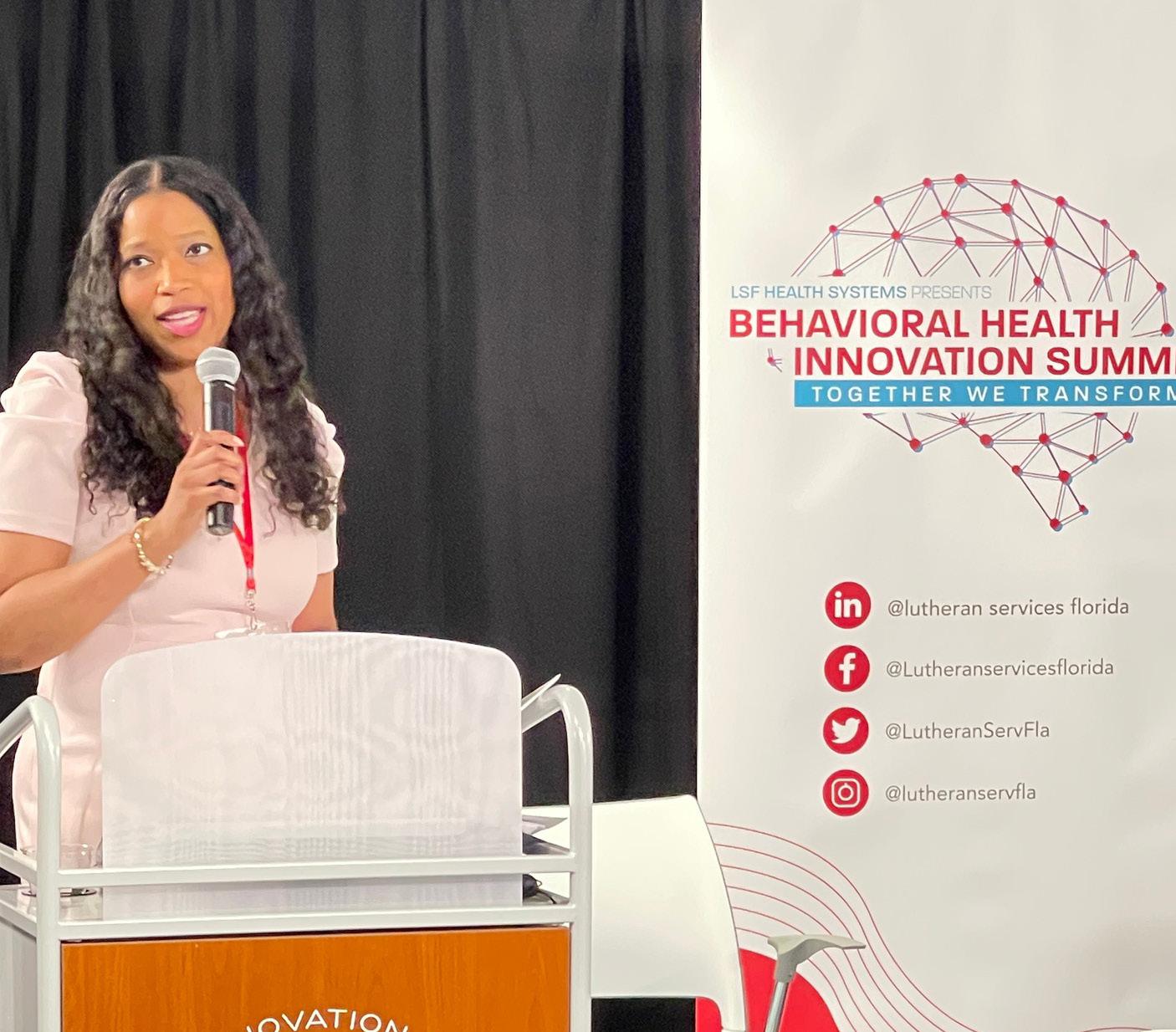
In topics ranging from criminal offenders and the opioid epidemic to legislative and funding issues, presenters returned time and time again to the importance of innovation in today’s environment, said Dr. Christine Cauffield, CEO of LSF Health Systems.
“The challenges we face today in behavioral health are too big to confront with only the solutions that have worked in the past,” Cauffield said. “We launched this summit to encourage leaders to share how they’re addressing issues never confronted. The response has been tremendous. What we’re learning from our providers will undoubtedly save lives.”
Author and keynote speaker Nick Kittle reiterated the summit’s theme of innovation taking courage. He compared innovation to creating trauma. “Innovation is
Firefighters, police officers, and emergency medical service personnel are often first on the scene when an emergency occurs, and 911 telecommunicators are the first point of contact for citizens in need. The first responder profession is one of the most gruelling professions, both mentally and physically, and attracts individuals from a variety of backgrounds.

These individuals risk their lives to support and protect community members. Being a first responder means exposure to stressful and challenging events. This continued exposure, as well as other occupational and personal factors, are increasingly associated with higher rates of relationship issues, alcohol or drug misuse, and suicide attempts and completions.

hard because it requires change,” Kittle said. “Mentally, change is trauma. So, innovation is literally creating trauma.”
Kittle challenged summit attendees to examine closely what holds them back from innovating, and to embrace new ideas and risk-taking.
“Controversy often creates moments of opportunity, if you lean into it,” he said. “Establish the urgency. If we build urgency, we can get into it. If you’re not excited about what you’re selling, why would anyone else be?”
Other speakers at the event included global fundraising expert Bob Carter, a founding member of the World Health Organization Foundation. On April 20, a panel of the state’s top behavioral health funders discussed how they promote and support innovation to remove systemic barriers and improve timely access to evidencebased care. Another panel of recovery peer specialists and leaders highlighted innovative ways that peers are making a difference in the state-funded system of care.
The event sponsors included the Florida Department of Children and Families, Humana, Humana Healthy Horizons, the Here4YOUth Initiative of Charles & Margery Barancik Foundation and Gulf Coast Community Foundation, Nona Scientific Laboratory, and Health-Tech Consultants.
In early 2022, LSF Health Systems was one of five Florida organizations awarded a one-year $1.8M grant from the Florida Department of Children and Families to help address this growing problem. For this grant, first responders are defined as: firefighters, police officers, sheriffs, emergency medical technicians, and 911 operators/dispatchers within 20 counties of DCF’s Northeast Region. These counties include Alachua, Baker, Bradford, Clay, Columbia, Dixie, Duval, Flagler, Gilchrist, Hamilton, Lafayette, Levy, Madison, Nassau, Putnam, Suwannee, St. Johns, Taylor, Union, and Volusia.
A recent U.S. Surgeon General’s report highlighted suicides as a significant public health problem. Even before the pandemic, there were 47,500 suicide fatalities in the U.S. and an estimated 1.4 million suicide attempts each year. The causes of suicide are complex, with many personal, socio-demographic, medical, and economic factors playing a role.
One potential risk factor is occupation, with several categories presenting as higher risk for suicide, including first responders. Law enforcement officers and firefighters are more likely to die by suicide than in the line of duty. Furthermore, EMS providers are 1.39 times more likely to die by suicide than the public.
Studies have found that between 17% and 24% of public safety telecommunicators have symptoms of posttraumatic stress disorder and 24% have symptoms of depression. These numbers indicate deaths among first responders are likely under-reported.
LSF Health Systems is the lead agency on the project partnering with 2-1-1 First Call for Help, Children’s Home Society, Daigle Creative, First Responder Project, Here Tomorrow, United Way of NE Florida, Well Florida, and our behavioral health provider network. The goal of the project is to provide regional prevention and early intervention services to first responders and their
families. This includes enhancing access to information and referral supports, linkages to community services and follow-up supports to mitigate the impact of traumatic stress among first responders.
The grant includes a needs assessment and information and referral services. An extensive public awareness campaign for first responders to help educate them about available mental health resources specifically designed for their needs was launched. Individuals with lived experience, or peer specialists, are a critical part of the project. They work with first responders and their families with the support of a behavioral health navigator to determine eligibility and refer to providers as needed.
First responders in need of additional behavioral health services are connected with providers in LSF Health Systems’ behavioral health provider network. Services for first responders and their families who are uninsured, under-insured or have co-pays that create a hardship to seek treatment are paid with grant dollars.
62
organizations working with us to provide state-funded mental health and substance use programs in a 23-county region
576 673 202
at-risk children and adults served by our Care Coordination program that promotes care transitions for individuals with complex behavioral health needs.
callers served
by our Access to Care Line, a free resource that offers 24/7 screenings, referrals and information about mental health and substance use programs
Funding Total
$192,307,844
diversions
DCF-SAMH FUNDING FOR PROGRAMS
individuals served by our network of contracted behavioral health organizations
from both civil and forensic state hospitals for individuals who are either at-risk of or have already been committed to a state hospital
including carry forward
300+ 3,135 10
individuals trained
since 2015 to become certified as either Certified Recovery Peer Specialists or Certified Recovery Support Specialists
1,017,592 65% 1,325
85
training sessions provided to community stakeholders
individuals trained in specialty behavioral health topics
approval rate for individuals with mental health or substance use challenges whom we helped increase access to Social Security disability benefits, this compares favorably to the national average of 60%
law enforcement calls in 2021-2022 that included mental health co-responders through programs we fund that diverted 91% of individuals from jail into treatment
community partners certified to deliver Applied Suicide Intervention Skills Training of Trainers
3%
=100%
of adults enrolled in care coordination who were admitted into a crisis stabilization unit/inpatient or inpatient detoxification were readmitted within 30 days after discharge. 1% REDUCED RECIDIVISM
Goal 51% Goal 48%
LIVING IN A STABLE HOUSING ENVIRONMENT
ADULT MENTAL HEALTH
CHILDREN’S MENTAL HEALTH
SUCCESSFULLY COMPLETE SUBSTANCE TREATMENT SERVICES
51% 89%
of adults receiving substance abuse services completed treatment
of children receiving substance abuse services completed treatment
of adults with severe and persistent mental illnesses live in a stable environment
97%
92% 93%
Goal 85% Goal 89%
Goal 64%
of adults in forensic involvement live in a stable housing environment
of adults with substance abuse lived in stable housing at time of discharge
100% 100%
Goal 91% Goal 88%
of children served for mental health lived in a stable housing environment
94% ATTENDING SCHOOL
of required school days attended by children with serious emotional disturbance
ADULT SUBSTANCE ABUSE CHILDREN’S SUBSTANCE ABUSE
of children with substance abuse lived in stable housing at time of discharge
of children experiencing emotional and serious emotional disturbances had improved functioning after receiving services
SUCCESSFUL DAYS WORKING AND COMPETITIVE EMPLOYMENT
Goal 40 Days Goal 24%
79 DAYS 38%
annual average of amount of time adults with severe, persistent mental health challenges worked
of adults with serious mental health challenges were competitively employed
• State of Florida, Department of Children and Families
• Substance Abuse and Mental Health Services Administration
• Health Resources & Services Administration
• Florida Blue Foundation
• Hernando County Commissioners
• Marion County Commissioners
• U.S. Department of Justice
• City of Jacksonville
• The Early Learning Coalition of Flagler and Volusia Counties
• Volusia County Commissioners
• State of Florida, Department of Children and Families
• PS27 Ventures
• Stabilify
• Janssen Neuroscience
• Ability Housing of Northeast Florida
• Alachua County Board of County Commissioners
• BayCare Behavioral Health
• Camelot Community Care
• Cathedral Foundation, d/b/a Aging True
• CDS Family and Behavioral Health Services
• Child Guidance Center
• Children’s Home Society of Florida
• Clay Behavioral Health Center
• Community Coalition Alliance
• Community Rehabilitation Center
• CRC Health Treatment Clinics, d/b/a Volusia County Comprehensive Treatment Center
• Daniel Memorial
• DaySpring Village
• Delores Barr Weaver Policy Center
• Eckerd Youth Alternatives
• EPIC Community Services
• Flagler Hospital
• Flagler Open Arms Recovery Services
• Fresh Ministries
• Gainesville Opportunity Center
• Gainesville Peer Respite
• Gateway Community Services
• Gulf Coast Jewish Family and Community Services
• Halifax Hospital Medical Center
• Hanley Center Foundation
• I.M. Sulzbacher Center for the Homeless
• Inspire to Rise
• LifeStream Behavioral Center
• Marion Senior Services
• Marlyn Behavioral Health System, d/b/a Quality Resource Center
• Mental Health America of East Central Florida
• Mental Health Resource Center
• Meridian Behavioral Healthcare
• Metro Treatment of Florida, d/b/a Jacksonville Metro Treatment Center, d/b/a Quad Metro Treatment Center, d/b/a St. Augustine Treatment Center, d/b/a Duval Treatment Center, d/b/a Daytona Treatment Center
• Mid Florida Homeless Coalition
• Mr and Ms Mentoring
• NAMI Hernando
• Nassau County Mental Health, Alcoholism & Drug Council, d/b/a Starting Point Behavioral Healthcare
• National Alliance on Mental Illness of Marion County
• New Hope Education and Addiction Services, d/b/a First Coast Recovery Advocates
• New Hope Education and Addiction
• State of Florida, Department of Children and Families
• Hamilton Co Coalition Against Drugs and Alcohol
• WellCare
• Gainesville Health & Fitness
• Saint Leo University Dept of Human Services
• Marion County Children’s Alliance
• Hanley Foundation
• Shands Vista
• Families First of Florida
• Meridian
• Saint Leo University Ocala/Gainesville/ Jacksonville
• Levy County Prevention Coalition
• Gilchrist Prevention Coalition
Services, d/b/a Florida Recovery Schools
• Northwest Behavioral Health Services
• Operation PAR
• Osceola Mental Health, d/b/a Park Place Behavioral Health Care
• Outreach Community Care Network
• Phoenix Programs of Florida, d/b/a Phoenix Houses of Florida
• River Region Human Services
• School District of Clay County - SEDNET
• Shining Light Peer Services
• SMA Healthcare
• SMA Healthcare, f/k/a The Centers
• St. Augustine Youth Services
• The Chrysalis Center, d/b/a Chrysalis Health
• The House Next Door
• United Way of Northeast Florida
• United Way of Suwannee Valley
• Urban Jacksonville, d/b/a Aging True
• Van Gogh’s Palette, d/b/a Vincent House
• Volunteers of America of Florida
• Volusia Recovery Alliance
• Zero Hour Life
• State of Florida, Department of Children and Families
• Humana and Humana Healthy Horizons in Florida
• Here 4 YOUth Initiative of Charles & Margery Barancik Foundation and Gulf Coast Community Foundation
• Nona Scientific Laboratory
• Health-Tech Consultants
